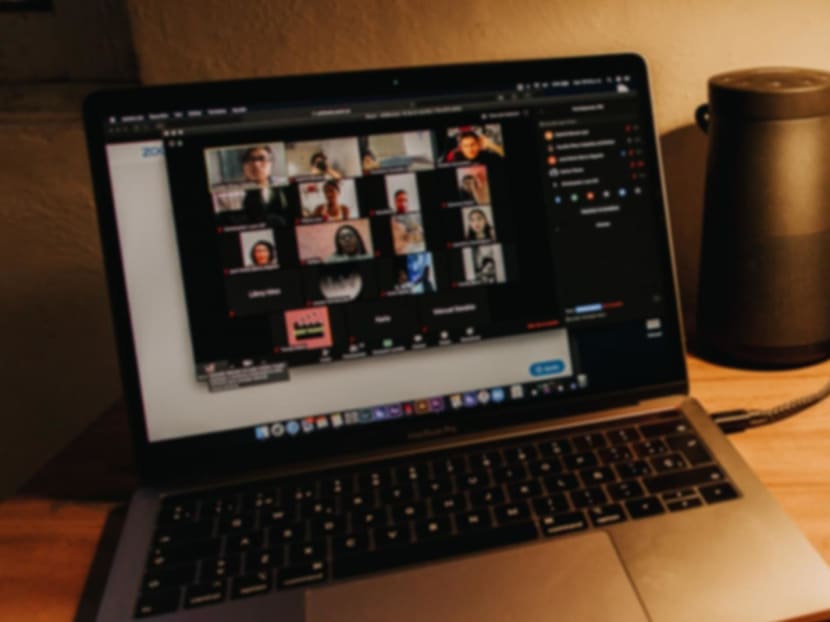Workers regularly using video-conferencing apps for meetings suffer more fatigue: NTU study

- Close to half of the 1,145 fully-employed respondents to a survey reported feeling fatigued or overwhelmed from video-conference meetings
- The survey was done in December 2020, when most of the country was working from home
- Among the causes of fatigue was feeling that everyone is constantly making eye-contact and the “mirror anxiety” of seeing yourself
SINGAPORE — A study has confirmed what many people working from home during the Covid-19 pandemic suspected: Increased use of video-conferencing applications such as Zoom can lead to more fatigue. Seeing oneself onscreen is part of the problem, it found.
Researchers at Nanyang Technological University (NTU) found that nearly half of the workers they surveyed felt fatigue from video-conferencing, and their level of tiredness grew with rising numbers of online meetings in a day.
The survey, conducted in December 2020 when most of the country was working from home, found that 46.2 per cent respondents reported feeling fatigued or overwhelmed from using video-conferencing apps.
The study’s lead researcher Benjamin Li, from NTU’s Wee Kim Wee School of Communication and Information, said that the results showed a clear relationship between frequent use of video-conferencing apps and fatigue in Singapore workers.
“Our findings are even more relevant in today’s context, since the use of video-conferencing tools is here to stay due to flexible work arrangements being a continuing trend," he added.
The researchers analysed responses of a commissioned online survey of 1,145 fully-employed workers in Singapore — citizens, permanent residents and a small proportion of foreigners — who used video-conferencing apps frequently.
On average, these respondents spent about three days working from home in a typical week and spent about nine hours working each day.
Besides how often they used these apps, other factors such as the number of hours worked, their income level or age had a weaker association with video-conferencing fatigue, the researchers found.
And while other earlier studies have shown that video-conferencing fatigue is worse for women, who may face more anxiety seeing their face constantly because of societal norms about a woman’s appearance, the NTU study suggested that these norms may not be as prevalent in Singapore compared to Western cultures.
The findings were published last month in the peer-reviewed journal Computers in Human Behavior Reports. The study was co-authored by Assistant Professor Edmund Lee, Assistant Professor Edson Tandoc and research fellow Goh Zhang Hao
WHAT CAUSES ZOOM FATIGUE?
Compared to physical meetings, video-conferencing dramatically increases the amount of eye contact and can lead to workers feeling stress and social anxiety, the researchers said.
This is because meeting participants looking at their screens tend to appear like they are making eye contact with you even when you are not speaking.
When workers turn on their webcams and can see themselves on the screen, it can also lead to what researchers call “mirror anxiety”, stemming from the self-consciousness of seeing themselves.
“What the results suggest is that when users are overwhelmed with many video-conferences, even the quality of the internet connection does not help.Assistant Professor Benjamin Lee, lead researcher”
The study also found that a stable internet connection was linked to lower levels of fatigue for workers who had only a few video-conferences in a day.
However, for frequent video-conference users, a reliable connection did not mitigate their levels of fatigue.
Assistant Professor Li, who is also the assistant director of NTU’s Centre for Information Integrity and the Internet, said: “What the results suggest is that when users are overwhelmed with many video-conferences, even the quality of the internet connection does not help.”
With video-conferencing, people may end up packing their day with back-to-back meetings, leading to exhaustion at the end of the workday, the researchers said.
Beyond cutting down the number of meetings, Asst Prof Li advised employers to give workers the flexibility to turn off their cameras during meetings as a way to make online meetings less tiring.
Employers could also set alerts on the video-conferencing app to remind participants of the time so that meetings do not drag out for too long, he added.











